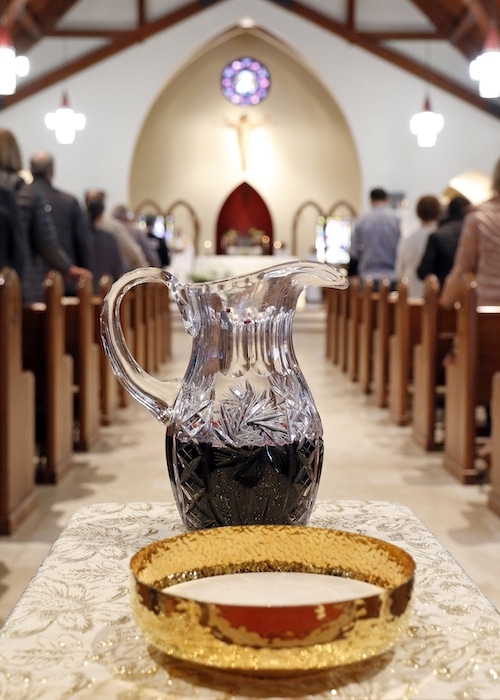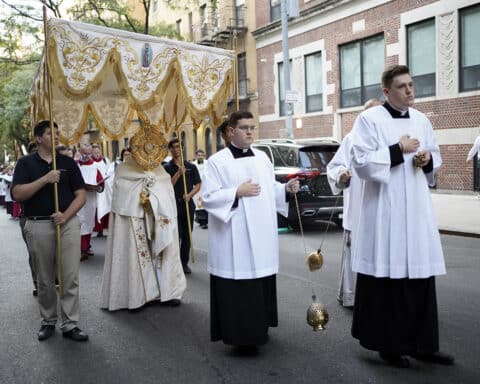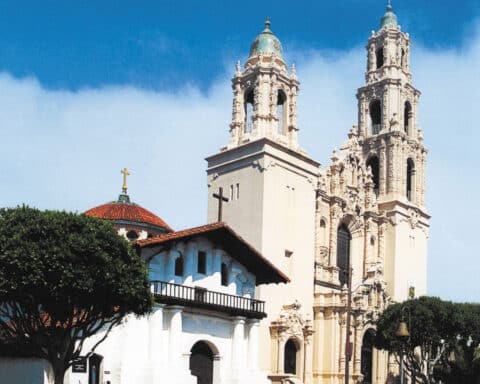The Eucharist is not a one-way gift, though it is tempting to think so. While it is true that the most magnificent giving comes from the side of God when we receive the body and blood of Our Lord Jesus Christ under the appearance of bread and wine, that greater side of divine giving calls forth and indeed demands human giving from our side. Never an act of mere consumption, the Eucharistic encounter is, in full, an event of mutual giving, of exchange. To prepare fully for the Eucharist requires both the preparation of bringing an offering to the altar and a response of departing from the altar with an offering. The principal offering is the Lord’s, but his offering is fulfilled in the offering of those of us blessed to receive.
In a short book under the title “My Mass” (Newman Press), Jesuit Father Joseph Putz expresses this mystery of Eucharistic exchange in the following way. He says: “The real meaning of the Mass is the ineffable union of our sacrifice with the sacrifice of Christ, a union signified and effected by the change of our gifts into the Victim of Calvary. The real mystery of the Mass is this spiritual and supernatural union of Christ with His members in the act of self-surrender to God.”
The true sacrifice of the Mass is mutual: Christ’s sacrifice (underwritten by the sacrifice of the Father) and our sacrifice. This may, at first blush, seem presumptuous because who are we to offer anything that can compare with the sacrifice of Christ? But the point here is not to compare sacrifices, as if this were a matter of equity. The sacrifices are not equal — that is not the point. The point is that Christ’s sacrifice is truly efficacious in us when we come to him with our own small sacrifices and then return from our encounter with him prepared to offer further sacrifices in his name and with his love. The point of the Eucharist is that we are changed.
What does this mean for forming our children well for the Eucharist? At minimum, it means teaching them and forming them to bring sacrifices to the Lord at the altar, and then teaching them and forming them to respond to the gift of the Eucharist by making further sacrifices.

Bringing sacrifices to the altar
What appears as a mere transitional moment of the Mass is, in truth, the expression and performance of the offerings we are meant to bring. After the completion of the readings and the homily during the Liturgy of the Word, right at the outset of the Liturgy of the Eucharist, the gifts of bread and wine (and oftentimes, the tithes of the faithful) are brought forth to the sanctuary. These gifts are taken up to the altar, prayed over, and then made available for the divine work of consecration. All we can do once those gifts are made present on the altar is beg the Lord, in the words of the liturgy, to make these humble gifts into the body and blood of Our Lord Jesus Christ. The center of the Mass is God’s magnificent work.
But without the presentation of the gifts of bread and wine, God’s magnificent work will not begin. We could say that we give God permission to do his work, yet it would be more accurate to say that God waits for us to make our humble offering so that his offering will be, at least in part, a response to our own. God dignifies us by making the Eucharist in part — in very, very small part, but in part nonetheless — our work, as well as his. The offering of our gifts of bread and wine — which, no doubt, themselves depend on God’s own giving in creation — is the sign and the action of presenting ourselves to the Lord for the sacrament.
The offering of bread and wine is not meant to be the offering of bread and wine alone. With the bread and wine, we the faithful offer our prayers, our needs, our own acts of charity, our devotions, our petitions and our trust. For most of us most of the time, we allow this moment of offering to pass us by as a mere movement of the Mass — a moment of transition. Becoming more fully formed to the Eucharist, however, calls us toward preparing for that offering more completely, more consciously, more actively and more willingly. To prepare ourselves and our children well for the Eucharist, we ought to focus on preparing our own offerings to be brought to the altar under the appearance of bread and wine.
I have begun to consider a brief, regular and intentional practice for taking this aspect of Eucharistic formation more seriously. During the offering of the gifts during Mass, I think it wise and formative to offer an intentional prayer, one which actually requires us to consider in advance what it is that we are bringing to the Lord at this Eucharist. What we bring forth as a sacrifice and offering may very well be some works of charity from the preceding week, or some need or petition, or some concern or some failing in need of forgiveness. The most important thing is to bring something of ourselves to the Lord, to offer it to him, and to beg him to take it, bless it, break it and give it back to us in his mercy.
I suggest a prayer like the following during the presentation of the gifts (offered silently, from each of us, and taught to our children for them to offer, too): “My Lord and my God, with these gifts I offer you not only my needs but also my charity and my sacrifices. In this Eucharist, I pray especially that you take and bless my humble offering of [name your charity or sacrifice or need]. Unite my sacrifice to your own and nourish me again with the gift of your love. Amen.”
Offering sacrifices from the altar
In his encyclical Deus Caritas Est, Pope Benedict XVI memorably wrote that “a Eucharist which does not pass over into the concrete practice of love is intrinsically fragmented” (No. 14). Benedict, like Putz before him, is steering us away from considering the Eucharist in terms of mere consumption and toward a Eucharistic reality that calls for our own intentional and active participation. In this case, the emphasis is being placed on how we respond to the gift of the Eucharist — namely, by becoming a bond of communion and an offering of charity for others.
The greatest gift comes from God, who, while we were still sinners, loved us in his Son, Jesus Christ. He gives us what we need most when we deserve it least. The Eucharist is this very gift, given perpetually until the end of time. In Christ, we receive what we have not merited.

In that gift of God, what we receive in Christ includes the grace and the call to give unto others in the manner we ourselves have received. That means that those who receive the Blessed Sacrament receive, in Christ, the mission and the mandate to offer charity regardless of the merit of those who need it. We become conformed to Christ who gives himself to us as we carry the sacrament into acts of giving ourselves to others.
This to me seems another side of Eucharistic formation. How do we better form each other — and especially our children — to respond to the love of Christ in our love of neighbor? The more direct and concrete the acts of love, the better. The works of mercy are in sum the prescribed, choreographed steps for entering more deeply into the love of Christ by loving others. To receive him ever more fully as our daily bread, we venture to feed others. To drink in eternal life from him, we give drink to others. To clothe ourselves in his glory, we clothe others. To receive his forgiveness in full, we practice forgiving others. And so on.
Formation in the works of mercy is not separate from Eucharistic formation, but rather part of its completion and fulfillment. If, on the first side, we are called to prepare to bring an offering to the altar, on the other side, we are called to allow Christ’s self-gift to become our acts of self-giving to others. As Joseph Putz expresses it so well, “The true purpose of the Mass, then, is not to make Christ offer Himself anew for us: He has offered Himself ‘once for all’; nor is it to make us offer Christ instead of ourselves, but to make us offer ourselves with Him and through Him.”
Amen.
Sincerely,






